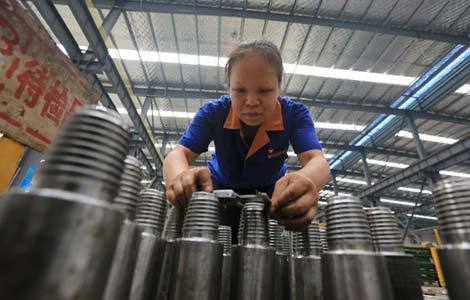Getting to grips with problems
Updated: 2013-07-16 07:15
By Yuan Zheng (China Daily)
|
||||||||
China and the US should try to control and narrow differences on specific issues to advance bilateral relations
The fifth China-US Strategic and Economic Dialogue was held in Washington D.C. on July 10 and 11, centering on the consensus reached by President Xi Jinping and his US counterpart Barack Obama, at their summit in Sunnylands, California, in June that the two countries seek to build a new type of relationship between major powers. The talks have achieved tangible results and are an important step forward toward building greater trust between the two countries.
Special representatives Vice-Premier Wang Yang and US Treasury Secretary Jacob Lew co-chaired the Economic Track talks and State Councilor Yang Jiechi and US Secretary of State John Kerry co-chaired the Strategic Track talks. Both teams spoke highly of the S&ED platform and agreed to further improve the mechanism. Hotlines between the special representatives will be established to facilitate communication.
During the talks China and the US reached important agreements on climate change, energy, trade and investment cooperation.
In dealing with climate change, the two sides have reached a consensus on five concrete measures to reduce greenhouse gas emissions, promote energy conservation and environmental protection. The two countries will further strengthen policy consultation and dialogue, and jointly promote more multilateral cooperation to combat climate change and endeavor to reach a new international climate change agreement. China said it will continue to invest in the US' shale gas industry.
Investment is an important area in advancing China-US economic and trade cooperation. But for some time, the US has put obstacles in the way of Chinese companies investing in the US on the grounds of national security concerns while continually saying it welcomes Chinese investment. After conducting nine rounds of negotiations for a China-US Bilateral Investment Treaty, the two countries have agreed to start substantive negotiations as soon as possible. China's cumulative outbound direct investment in the US was $20 billion by May 2013, while cumulative US direct investment in China exceeded $70 billion. Reaching a high-level investment treaty will be a win-win result for investors in both countries.
However, China and the US have different positions in the international system and differences remain over a number of issues. Even though there might be principled consensus on some issues, the two countries still have difficulty seeing eye-to-eye on Taiwan, the disputes in the South China Sea, and even the Tibet and Xinjiang Uygur autonomous regions.
The two countries are also at odds over market access, the yuan's exchange rate and high-tech exports. Over the past four years, the Obama administration has proposed on several occasions to relax restrictions on high-tech exports to China, but it has not taken any substantive initiatives. During the dialogue, the US pledged to give fair treatment to China in its export control reform.
During the talks, the two countries also agreed to enhance the military-to-military relationship and decided to actively explore a notification mechanism for major military activities.
The revelations of the US' cyber espionage by whistleblower Edward Snowden have brought cybersecu-rity issues into focus. But while China is refraining from criticizing the US for extensive syping, the US has focused on so-called intellectual property theft rather than reflecting on its own actions.
With the deepening of China-US cooperation, there will be more problems and new challenges confronting both sides. Yet as long as Beijing and Washington strive to control differences, avoid misjudgment, and expand common interests through dialogue, bilateral relations will be able to overcome the numerous difficulties and develop in a pragmatic and rational manner.
The coming decade is crucial for the development of China-US relations, but considering their complexity it is unreasonable to expect one round of dialogue to solve all the problems that exist.
However, as long as the US and China can view bilateral relations from a strategic perspective, and seek to expand their common ground by working on specific issues, they will be able to avoid any misjudgments and control their differences, and in so doing they will make a major breakthrough in relations between a rising power and the established power.
This will, of course, be slow and tortuous, requiring both countries to show wisdom and patience.
The author is a researcher with the Institute of American Studies, the Chinese Academy of Social Sciences.
(China Daily 07/16/2013 page8)

 Putin wants Snowden to go, but asylum not ruled out
Putin wants Snowden to go, but asylum not ruled out
 Apple to probe death of Chinese using charging iPhone
Apple to probe death of Chinese using charging iPhone
 Investment falters as industrial activity flags
Investment falters as industrial activity flags
 Rape victim's mother wins appeal
Rape victim's mother wins appeal
 Reproduction of 'Sunflowers' displayed in HK
Reproduction of 'Sunflowers' displayed in HK
 Land Rover enthusiasts tour the world
Land Rover enthusiasts tour the world
 US star sprinter fails drug test
US star sprinter fails drug test
 Protests erupt after verdict
Protests erupt after verdict
Most Viewed
Editor's Picks

|

|

|

|

|

|
Today's Top News
Putin wants Snowden to go, asylum not ruled out
Trailblazer reaches out to inmates on death row
Air crash payouts could differ
Cabinet promises more funds for smaller firms
Capital prison tests therapy on inmates
Regulation to improve public organ donations
Japan seeks to 'nationalize' islands
Rebalancing the economy
US Weekly

|

|






